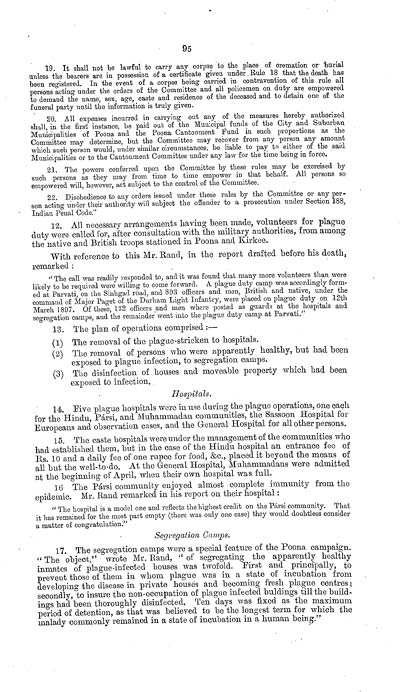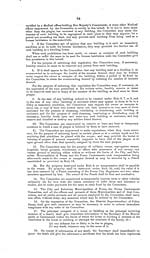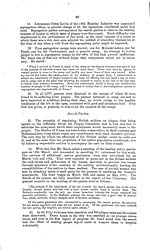Medicine - Disease > Account of plague administration in the Bombay Presidency from September 1896 till May 1897
(107) Page 95
Download files
Individual page:
Thumbnail gallery: Grid view | List view

95
19. It shall not be lawful to carry any corpse to the place of cremation or burial
unless the bearers are in possession of a certificate given under Rule 18 that the death has
been registered. In the event of a corpse being carried in contravention of this rule all
persons acting under the orders of the Committee and all policemen on duty are empowered
to demand the name, sex, age, caste and residence of the deceased and to detain one of the
funeral party until the information is truly given.
20. All expenses incurred in carrying out any of the measures hereby authorized
shall, in the first instance, be paid out of the Municipal funds of the City and Suburban
Municipalities of Poona and the Poona Cantonment Fund in such proportions as the
Committee may determine, but the Committee may recover from any person any amount
which such person would, under similar circumstances, be liable to pay to either of the said
Municipalities or to the Cantonment Committee under any law for the time being in force.
21. The powers conferred upon the Committee by these rules may be exercised by
such persons as they may from time to time empower in that behalf. All persons so
empowered will, however, act subject to the control of the Committee.
22. Disobedience to any orders issued under these rules by the Committee or any per-
son acting under their authority will subject the offender to a prosecution under Section 188,
Indian Penal Code."
12. All necessary arrangements having been made, volunteers for plague
duty were called for, after consultation with the military authorities, from among
the native and British troops stationed in Poona and Kirkee.
With reference to this Mr. Rand, in the report drafted before his death,
remarked:
"The call was readily responded to, and it was found that many more volunteers than were
likely to be required were willing to come forward. A plague duty camp was accordingly form-
ed at Parvati, on the Sinhgad road, and 893 officers and men, British and native, under the
command of Major Paget of the Durham Light Infantry, were placed on plague duty on 12th
March 1897. Of these, 122 officers and men where posted as guards at the hospitals and
segregation camps, and the remainder went into the plague duty camp at Parvati."
13. The plan of operations comprised :-
(1) The removal of the plague-stricken to hospitals.
(2) The removal of persons who were apparently healthy, but had been
exposed to plague infection, to segregation camps.
(3) The disinfection of houses and moveable property which had been
exposed to infection.
Hospitals.
14. Five plague hospitals were in use during the plague operations, one each
for the Hindu, Prsi, and Muhammadan communities, the Sassoon Hospital for
Europeans and observation cases, and the General Hospital for all other persons.
15. The caste hospitals were under the management of the communities who
had established them, but in the case of the Hindu hospital an entrance fee of
Rs. 10 and a daily fee of one rupee for food, &c., placed it beyond the means of
all but the well-to-do. At the General Hospital, Muhammadans were admitted
at the beginning of April, when their own hospital was full.
16 The Prsi community enjoyed almost complete immunity from the
epidemic. Mr. Rand remarked in his report on their hospital:
"The hospital is a model one and reflects the highest credit on the Prsi community. That
it has remained for the most part empty (there was only one case) they would doubtless consider
a matter of congratulation."
Segregation Camps.
17. The segregation camps were a special feature of the Poona campaign.
"The object," wrote Mr. Rand, " of segregating the apparently healthy
inmates of plague-infected houses was twofold. First and principally, to
prevent those of them in whom plague was in a state of incubation from
developing the disease in private houses and becoming fresh plague centres;
secondly, to insure the non-occupation of plague infected buldings till the build-
ings had been thoroughly disinfected. Ten days was fixed as the maximum
period of detention, as that was believed to be the longest term for which the
malady commonly remained in a state of incubation in a human being."
19. It shall not be lawful to carry any corpse to the place of cremation or burial
unless the bearers are in possession of a certificate given under Rule 18 that the death has
been registered. In the event of a corpse being carried in contravention of this rule all
persons acting under the orders of the Committee and all policemen on duty are empowered
to demand the name, sex, age, caste and residence of the deceased and to detain one of the
funeral party until the information is truly given.
20. All expenses incurred in carrying out any of the measures hereby authorized
shall, in the first instance, be paid out of the Municipal funds of the City and Suburban
Municipalities of Poona and the Poona Cantonment Fund in such proportions as the
Committee may determine, but the Committee may recover from any person any amount
which such person would, under similar circumstances, be liable to pay to either of the said
Municipalities or to the Cantonment Committee under any law for the time being in force.
21. The powers conferred upon the Committee by these rules may be exercised by
such persons as they may from time to time empower in that behalf. All persons so
empowered will, however, act subject to the control of the Committee.
22. Disobedience to any orders issued under these rules by the Committee or any per-
son acting under their authority will subject the offender to a prosecution under Section 188,
Indian Penal Code."
12. All necessary arrangements having been made, volunteers for plague
duty were called for, after consultation with the military authorities, from among
the native and British troops stationed in Poona and Kirkee.
With reference to this Mr. Rand, in the report drafted before his death,
remarked:
"The call was readily responded to, and it was found that many more volunteers than were
likely to be required were willing to come forward. A plague duty camp was accordingly form-
ed at Parvati, on the Sinhgad road, and 893 officers and men, British and native, under the
command of Major Paget of the Durham Light Infantry, were placed on plague duty on 12th
March 1897. Of these, 122 officers and men where posted as guards at the hospitals and
segregation camps, and the remainder went into the plague duty camp at Parvati."
13. The plan of operations comprised :-
(1) The removal of the plague-stricken to hospitals.
(2) The removal of persons who were apparently healthy, but had been
exposed to plague infection, to segregation camps.
(3) The disinfection of houses and moveable property which had been
exposed to infection.
Hospitals.
14. Five plague hospitals were in use during the plague operations, one each
for the Hindu, Prsi, and Muhammadan communities, the Sassoon Hospital for
Europeans and observation cases, and the General Hospital for all other persons.
15. The caste hospitals were under the management of the communities who
had established them, but in the case of the Hindu hospital an entrance fee of
Rs. 10 and a daily fee of one rupee for food, &c., placed it beyond the means of
all but the well-to-do. At the General Hospital, Muhammadans were admitted
at the beginning of April, when their own hospital was full.
16 The Prsi community enjoyed almost complete immunity from the
epidemic. Mr. Rand remarked in his report on their hospital:
"The hospital is a model one and reflects the highest credit on the Prsi community. That
it has remained for the most part empty (there was only one case) they would doubtless consider
a matter of congratulation."
Segregation Camps.
17. The segregation camps were a special feature of the Poona campaign.
"The object," wrote Mr. Rand, " of segregating the apparently healthy
inmates of plague-infected houses was twofold. First and principally, to
prevent those of them in whom plague was in a state of incubation from
developing the disease in private houses and becoming fresh plague centres;
secondly, to insure the non-occupation of plague infected buldings till the build-
ings had been thoroughly disinfected. Ten days was fixed as the maximum
period of detention, as that was believed to be the longest term for which the
malady commonly remained in a state of incubation in a human being."
Set display mode to: Large image | Zoom image | Transcription
Images and transcriptions on this page, including medium image downloads, may be used under the Creative Commons Attribution 4.0 International Licence unless otherwise stated. ![]()
| India Papers > Medicine - Disease > Account of plague administration in the Bombay Presidency from September 1896 till May 1897 > (107) Page 95 |
|---|
| Permanent URL | https://digital.nls.uk/74517224 |
|---|




